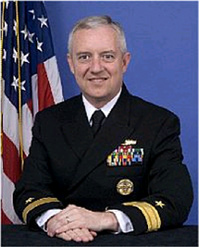On Tuesday, the Introduction to Environmental Security and Climate Change presented by John Lanicci and James Ramsay of Embry-Riddle Aeronautical University broadened the scope of national security issues to include extreme environmental events and climate anomalies, the destabilizing effects of these events, and the potential security implications.
In this clip, Lanicci discusses the accompanying chart from the U.S. Transportation Command.
national security
Counting the Cards in Nature's Casino

With “New Demands on Science and Services” being the theme of this AMS Annual Meeting in Atlanta, it is safe to say that no demand on climate science is more novel and complex than the national security angle of climate change. Strife in Africa is one area, as we mentioned here, but other flash points include the security of borders once covered by glaciers, water scarcity in numerous regions, and the newly navigable Arctic waterways.
It’s no wonder the Oceanographer of the Navy has gotten involved in this new area. Rear Admiral Dave Titley, oceanographer of the Navy, who has been charged with the U.S. Navy Task Force Climate Change, will be one of several national security experts featured in the two-part Tuesday Joint Session panel discussions (11 a.m. and 1:30 p.m.) on “Environmental Security: National Security Implications of Global Climate Change.”
In an interview on climate change with Armed Services radio, Admiral Titley showed a strikingly forward, mission-oriented viewpoint on the Navy’s interest in climate change, and not just the practical attitude of an officer with a research background.
“We’re operating in Nature’s casino,” he said, “and I intend to count the cards.”
When Wars Are Hot, Crops Are Not
As if it weren’t enough to keep track of arms trafficking, political mischief, and ethnic tensions around the world, now international aid agencies and national security watchdogs are told they have to watch temperatures, too. An article last week in the Proceedings of the National Academy of Sciences links warm years in West Africa with major civil conflicts (defined to include battle deaths of at least 1,000).
The authors, led by Marshall Burke, an economist at the University of California, Berkeley, show that temperature has a stronger relationship to internal strife than typical indicators like per capita income or type of political regime. They predict more conflict in the region as the world warms.
Other studies, noting the centrality of rain-fed agriculture in West Africa, have identified precipitation as a regional security indicator. However, the new study shows that temperature may be an even better
